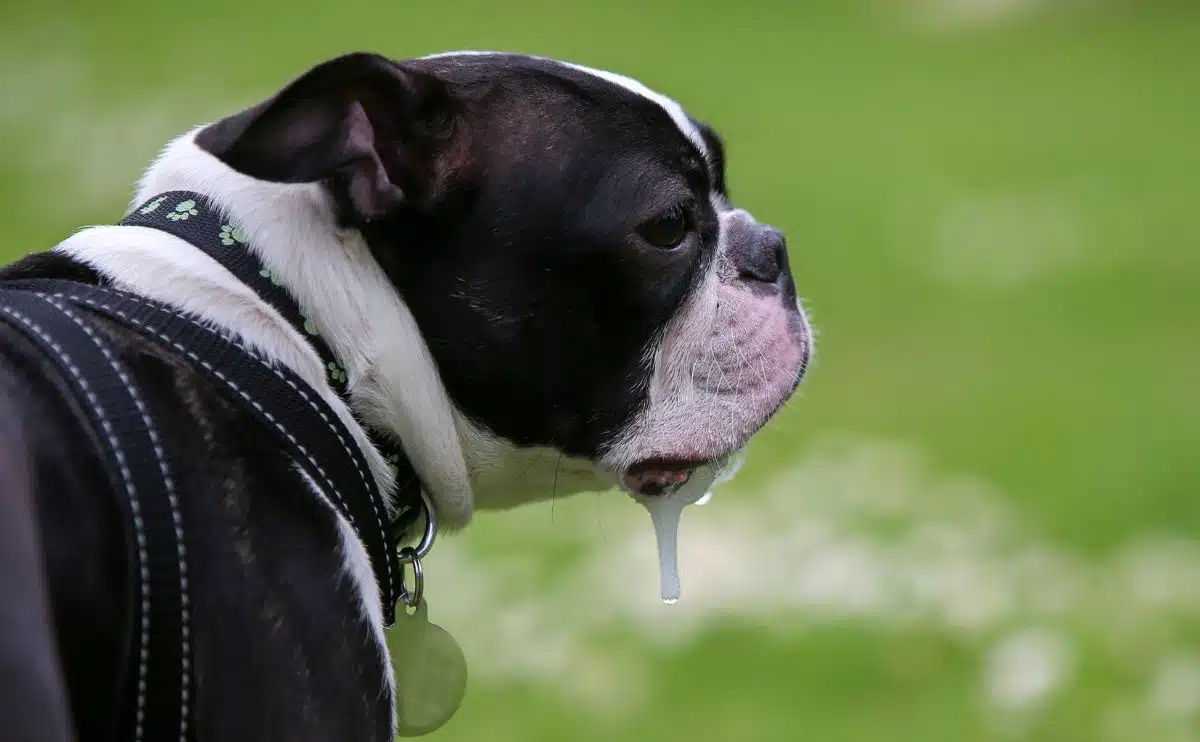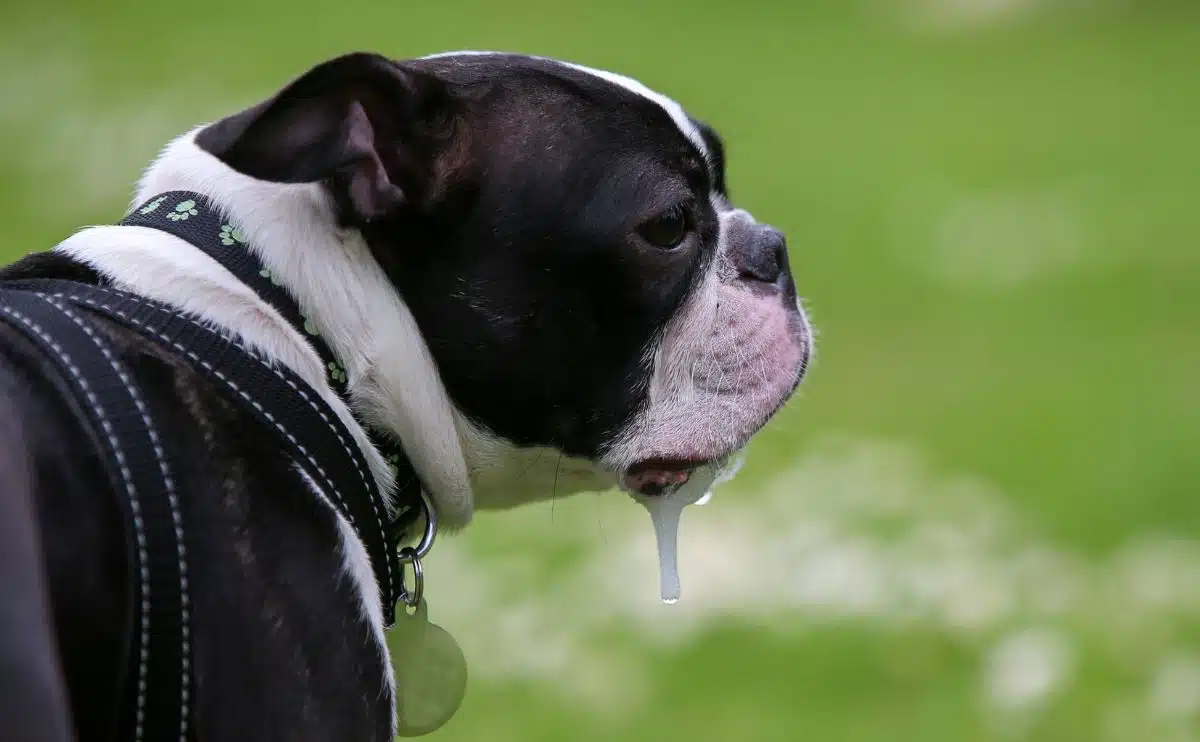
To keep the lights on, we receive affiliate commissions via some of our links. Our review process.

Some dogs are slobbery messes, while others rarely drool. But no matter where your furry friend falls on the salivation spectrum, excessive drooling (medically termed ptyalism or hypersalivation) compared to what’s normal for your dog is often a sign that something’s not right. We’ll help you identify the signs of worrisome excessive drooling and when it’s time for veterinary care.
Why Is My Dog Drooling? When It’s Normal
Contents
So, why do dogs drool in the first place? Most of our canine companions drool occasionally out of hunger or excitement (often being excited about food!). In these cases, a relatively small amount of drool that lasts a few minutes is entirely normal. As long as your dog is drooling clear slime, it clears up fairly quickly, and your pup isn’t showing any signs of distress, this type of drooling is completely harmless.
There are, however, some breeds that normally drool a lot, primarily because of the shape of their lips and muzzles. These slobbery breeds, such as Saint Bernards, Bloodhounds, Bulldogs, Mastiffs, and Newfoundlands, have extra skin in their mouths that retain a lot of saliva. You know the ones. They spray saliva around when they shake their heads and could benefit from a doggy bib to drool-proof your furniture and floors.
If you have one of these super salivators, you’re likely attuned to what a normal amount of drool is for your dog. But even with these breeds, you need to pay special attention when drooling increases. So, when is drooling a sign of a medical problem? Several different health conditions can result in the excessive production of saliva or cause a dog to lose the ability to swallow saliva normally.
Medical Reasons For Excessive Drooling In Dogs
Is excessive drooling in dogs an emergency? A dog drooling a lot isn’t always an indication that you need to rush to the vet immediately, but this depends on the cause and other symptoms. One telltale sign that your dog’s drooling isn’t normal is if it’s colored or foamy. Foaming at the mouth can indicate a serious health threat. But even excessive clear, slimy drool can be a cause for concern. Some of the most common reasons for hypersalivation (and other signs to look out for) include:
Dental Issues
Tooth infections, a fractured tooth, tartar buildup, and gum disease can all cause excessive drooling. If your pup’s slobbering is due to dental problems, his drool may appear slightly bloody or brown and may have a rank odor. Dental issues may also cause your dog to paw at his mouth, have difficulty chewing, or lose his appetite.
Unfortunately, gum disease is quite common in dogs over the age of three years old. Veterinarians recommend brushing your pup’s teeth daily to keep his gums and teeth as healthy as possible. Giving your furry friend dental chews, tooth-safe rawhide alternative treats, and chew toys regularly can also help control tartar buildup. Just be sure to avoid giving your dog natural bones because they can cause tooth fractures.
Nausea
A common cause of sudden excessive drooling in dogs is nausea. When we feel nauseous, we experience a build-up of saliva in our mouths. And that’s even more exaggerated in dogs to the point of drooling a lot. Anything that causes nausea in your pup can result in excessive drooling. Motion sickness is a common culprit, which explains why some dogs get slobbery during car rides.
Drooling from an upset tummy is often a precursor to vomiting. If the drooling and vomiting continue or are severe, you should contact your vet to make sure your pup hasn’t swallowed a foreign object or a toxic substance.
Toxins
Ingesting a toxic substance, like poisonous plants, some human foods, household cleaning products, or yard chemicals, often causes sudden excessive salivation in dogs. Other signs of dog poisoning include foamy drool, vomiting, diarrhea, lethargy, decreased appetite, and lack of coordination. If you think your dog ate something toxic, contact your vet immediately. If you can’t reach your vet, contact an emergency vet clinic or poison control for dogs. You can reach the Pet Poison Helpline at (855) 764-7661.
Expert Tip: Some ways you can pet-proof your home and yard to minimize poisoning include using dog-safe yard products, cleaning agents, and pest control. Don’t give your furry friend table scraps or human food treats until you familiarize yourself with which foods are toxic to dogs. Also, make sure you only include pet-safe plants in your yard.
Mouth & Throat Problems
Trauma or an injury to the mouth or throat or a foreign object that’s lodged in the mouth or throat (e.g., a piece of bone) could be the reason your dog is suddenly excessively drooling. Typically in these situations, your pup will show signs of distress, such as shaking his head and pawing at his mouth. Oral lumps and cancers can also cause hypersalivation as well as difficulty eating and drinking.
Heat Stroke
Excessive drooling after a long walk or spending time in the hot sun could mean your pup is suffering from heat stroke. Dogs are more susceptible to overheating than humans, especially elderly pups, brachycephalic (flat-faced) breeds, and those with thick fur. Other signs of heat stroke include heavy panting, difficulty breathing, vomiting, lethargy, disorientation, and collapsing.
If you suspect your dog is experiencing heat stroke, take him to a cool location, give him drinking water, and place cool, wet towels on him. It’s crucial to treat this as a life-threatening emergency and seek veterinary care immediately.
Gastrointestinal Problems
Several gastrointestinal (GI) disorders can cause hypersalivation with varying degrees of severity. Some conditions like inflammation of the esophagus (esophagitis), gastric ulcers, GI cancers, and inflammatory bowel disease require a vet diagnosis and treatment but aren’t immediately life-threatening.
Intestinal blockage is fairly common in dogs because they love to chew on foreign objects which they can end up swallowing. In addition to increased salivation, a GI obstruction typically causes vomiting without the ability to defecate, loss of appetite, weakness, and signs of restlessness. As soon as you suspect your pup could have an intestinal blockage, seek veterinary care promptly. Left untreated, it can cause severe dehydration, intestinal rupture, and even death.
However, other gut-related problems that cause excessive drooling can prove fatal without swift medical care. Canine bloat is one of the most rapidly life-threatening conditions in dogs. Canine bloat (gastric dilatation-volvulus) occurs when the stomach balloons with gas and twists itself to the point of cutting off the blood supply. Other signs of bloat include a hard, swollen abdomen that’s painful when touched, retching without vomiting, anxiety and distress, and panting.
Other Conditions
Drooling is a symptom associated with several serious diseases and other health conditions. Some of these include:
- Kidney disease
- Liver disease
- Cancer or tumor in the mouth
- Rabies
- After suffering a seizure
- Sinus infections
- Facial nerve paralysis
Frequently Asked Questions
Here are some questions and answers about dog drooling that may be of help to you.
My Dog Is Drooling And Acting Strange: What Should I Do?
If your dog is suddenly behaving abnormally with or without drooling, you should contact your vet as soon as possible. Our pups can get into all kinds of trouble without us knowing what’s going on. Your vet is your best resource to understand what may be causing your dog’s strange behavior coupled with drooling.
What If My Dog Is Suddenly Drooling From One Side Of His Mouth?
A dog suddenly drooling on one side of his mouth usually indicates a localized issue, such as a damaged tooth or a foreign object lodged in that side of the mouth. Other reasons could be a bee sting or insect or spider bite. Check your pup’s mouth for any problems. If the cause for drooling isn’t clearly evident or you spot a broken tooth, bee sting, or mouth trauma, you should promptly seek veterinary care.
Should I Worry About My Puppy Drooling A Lot?
Puppies drool more than normal when they’re teething, which typically occurs at three to four weeks of age and then again when they’re four to seven months old (but can vary by breed). But puppies can also drool excessively for many of the medical reasons we describe above. They’re particularly susceptible to intestinal blockage due to their chewing habits. So, it’s important to pay attention to your puppy’s symptoms. When in doubt, seek veterinary care.
How Can Pet Insurance Help?
Our furry friends are susceptible to so many accidents and illnesses throughout their lives. Treatment and surgery for everything from an intestinal obstruction to a cancer diagnosis can result in thousands of dollars in vet bills. However, a reasonable monthly premium for pet insurance can cover a significant portion of your vet expenses for emergencies, accidents, and unforeseen illnesses.
You never want to face the decision of sacrificing your dog’s health and well-being because you can’t afford treatment. Check out our comprehensive pet insurance guide to see if it’s a worthy investment for your family.
Tagged With: